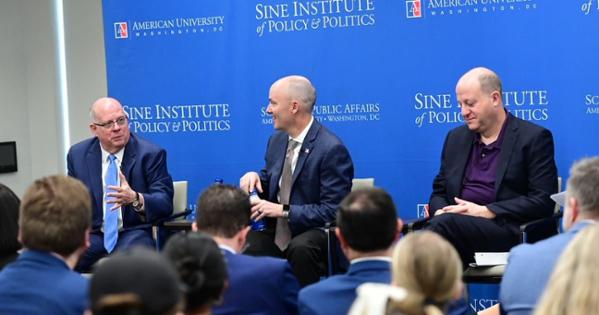Can Americans Learn to “Disagree Better”?

Larry Hogan is an anomaly in modern American politics.
In 2014, the Republican was elected governor of Maryland, a state where registered Democrats outnumber Republicans two to one. And despite being an outsider in what he called “the bluest state in America,” Hogan left the state house in 2023 with the highest-recorded approval rating of any governor in Maryland history.
“It wasn’t always easy,” said Hogan, now a US Senate candidate, at AU’s Constitution Hall on February 22. “We agreed on what the problems were, and we sometimes had different ideas on what the solutions were. But we were willing to compromise and find that middle ground we can all stand on, [and] we were able to accomplish amazing things for our state.”
Among his accomplishments, Hogan worked with a Democratic legislature to cut taxes eight years in a row by a combined $4.7 billion. He also reduced the cost of health care premiums in the state by over 30 percent and made historic investments in education, transportation and infrastructure, and protecting the environment.
Hogan’s first seminar as a 2024 fellow with AU’s Sine Institute of Policy and Politics explored political polarization in today’s hyper-partisan landscape. He was joined by Utah’s Republican governor Spencer Cox and Colorado’s Democratic governor Jared Polis.
Over the last six months, Cox and Polis, the respective chair and vice chair of the National Governors Association, have been traveling the country to speak about the organization’s Disagree Better initiative, which advocates for leaning into “healthy conflict.”
“It doesn’t simply mean that you abandon your principles or opinions,” Polis said. “It’s about how you disagree, and can [we] have those discussions in a way that elevates the discussions rather than attack the motives of the other person or call them un-American.”
Democrats and Republicans are now farther apart ideologically than at any time over the past 50 years, according to the Pew Research Center. A 2023 Pew survey revealed that a majority of US adults believe political debate has become less respectful and less fact-based in the last few years.
Positive views of government and political institutions are also at historic lows, according to Pew, with 60 percent of Americans expressing little or no confidence in the future of the US political system.
Despite the dismal views held by a majority of Americans, all three governors are optimistic that political division can be addressed by focusing on treating each other with more civility.
“I don’t have a simple fix, except to say this: It’s going to take all of us. This problem didn’t happen overnight, and it’s no one person’s fault,” Cox said. “I know it’s very easy to point to a major political candidate—maybe of my party—and say that that’s what happened. I would push back very strongly on that. That’s not true. We were headed this direction for a long time.”
Cox posited that as Americans have forged fewer connections in recent decades, political infighting has replaced a sense of community and the value of working together for common goals.
“It’s so much easier to tear down than it is to build up—in every facet,” Cox said. “I worked construction for a couple of summers. Whenever we got to demolish a building, it was so much fun.”
It can take just minutes to knock down what took years to build, Cox said. “The same is true of our friendships and our political discourse.”
During the event, the governors also offered advice to AU students. Among their wisdom: read widely, and have deep conversations with people on campus who view issues differently than you do to better understand their perspective.
“Take advantage of the time that you’re a student here because you have access to all of these conversations,” Polis said. “People tend to live where they’re more likely to have neighbors who agree with them politically. . . . You might not be around or be exposed to people with as many different ideas as you are during this time in college.”
While political polarization is just one issue the country faces, getting back to engaging with each other is an important first step toward progress, Hogan said.
“We can’t address the difficult issues facing our nation unless we are willing to work across the aisle with those whom we disagree with,” Hogan said. “And we must work to overcome the wedge politics and the petty rhetoric that’s used to belittle adversaries and enflame partisan divisions in America.”
Did you miss Hogan’s first Sine event? Register for his next seminar on campus, “Leadership in Crisis,” at 3 p.m. March 7.
